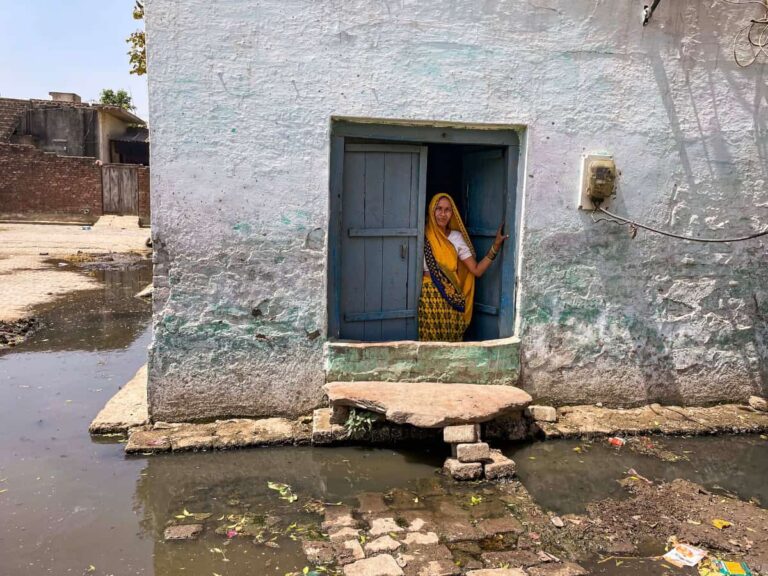Hathras: Four years after the gang rape and death of a Dalit teenager rocked the nation’s consciousness, the village of Bul Garhi has been forgotten, mired in a quagmire of neglect and struggle for livelihood, and an uncertain daily life. The sound of the election only echoes in the distance.
In 2020, the village was further polarized between the Thakur and SC communities after a 19-year-old woman was assaulted in the village, allegedly by upper caste men, and died two weeks later in a Delhi hospital. It became.
forgotten citadel
Cut off with no proper road access, people are forced to walk the last mile Bul Garhi (a name that ironically means forgotten citadel) is a small village whose main residents are upper caste Thakur. There are 90 ethnic households and 4 Dalit households.


The four Dalit families worked and continue to work, mostly in upper caste homes in the village. They live in huts in a Dalit ‘basti’ on the outskirts of the village.
Unrest in the village increased further when three of the four upper caste men accused of the crime returned home.
The victim’s family has not said much, and surveillance cameras continue to monitor their movements.
But they have a lot in common.
Immediate concerns rule life
For the residents of Bour Garhi, the tragedy of four years ago casts a long shadow, but life has returned to pressing concerns of rising prices, unemployment and the struggle for survival.
After the young woman’s death, police hastily cremated her body without the consent of her family, sparking further public outcry and calls for justice.
However, those voices of protest have faded into the distance. The brutal incident, which once drew national attention to the village, is now in the background.
“We were promised housing, but we have only just received the housing installment. As you can see, the sanitation problem is very serious here,” says a Dalit basti woman outside her home stranded in gutter water. said.
That’s not her only problem.
“My son is 30 years old and has no job. I want him and his family to stay away from this swamp and have a proper roof over their head,” she said on condition of anonymity.
The Thakur community area is better, but only slightly.
“Our infrastructure has improved, but sanitation still remains a problem. Roads are broken but it can be fixed,” added Uma Shankar, a local Thakur resident. .
With the May 7 elections just days away and Bur Garhi losing the Hathras Assembly constituency, there is a glimmer of hope that things will improve. The voices of marginalized people resonate with hopes for a better tomorrow, but the wheels of progress turn slowly.
polarized political choices
Their political choices are as polarized as the societies in which they live. Most villagers in Thakur district said they vote primarily for the Bharatiya Janata Party, which promotes Hindutva and the construction of Ram Mandir, but Dalit Basti villagers remain loyal to the BSP.
Uttar Pradesh Revenue Minister Anup Valmiki is a BJP contestant from the region. His main opponent is Jasveer Valmiki of the Samajwadi Party. Rajveer Diller, a sitting MP, recently passed away due to a heart attack.
The Bharatiya Janata Party has been winning in Hathras since 1991, except in 2009. Dalits and Thakur’s make up the majority of the constituency, followed by Brahmins.
Mr. Shankar said he would vote for the Bharatiya Janata Party again. He said the tragedies of 2020 are in the past and we need to look ahead, torn between seeking leaders who can bring jobs and curb inflation and those who advance an agenda of faith. Stated.
“The Bharatiya Janata Party promoted Hindutva and built a Ram temple. ‘Asta bahut zaroori hai humale rie (faith is very important to us)’ and owns land just outside the village. Shankar said.
Past wounds are secondary
As the political atmosphere heats up with impending elections, it is clear that the wounds of the past are secondary to the pressing realities of the present.
The return of the suspects is alarming, but even among Dalits, survival is prioritized over retaliation.
“What can we do? They’re back and we have to live with it. Our lives have always been difficult. We’re focused on getting through each day. ” said another resident of Dalit Basti.
Many in the Thakur community believe that the accused was innocent and that the whole thing was a huge “misunderstanding and mismanagement by the police”.
There were many promises from politicians. And they, too, disappeared into the noise of rural life.
“We were in the news for a while and then everyone left,” said a relative of the Dalit teenager.
“Many politicians, including leaders of the Bharatiya Janata Party, came to meet us back then, but now it is a forgotten topic. Nobody cares.”
He said the family received compensation from the government and used it only to sustain themselves.
“Yes, our roads need repairs and our children need jobs, but there is also deep-seated mistrust among our communities here. It takes time to heal wounds.” The girl’s relatives confirmed this.
While villagers stumble in their daily lives, politicians are also carefully finding ways to avoid problems.
“The incidents of 2020 have shocked the country. We will bring the focus back to women’s safety,” SP Valmiki said.
“The BJP’s agenda is exclusively development. The development work undertaken by the Modiji government in the last 10 years certainly makes us focus on development,” said Valmiki of the Bharatiya Janata Party.
Three of the accused in the 2020 case were acquitted due to lack of evidence, while one boy was found guilty and sentenced to three years in prison.
The young woman was allegedly dragged by the dupatta around her neck, causing spinal cord injuries. This violence left her paralyzed with a severe spinal cord injury, which resulted in her death.

